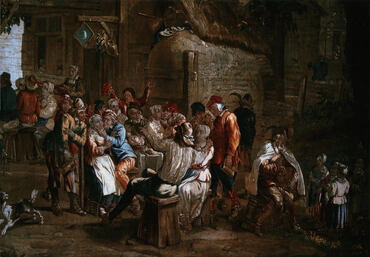1
And Jehovah saith unto Moses, `One plague more I do bring in on Pharaoh, and on Egypt, afterwards he doth send you away from this; when he is sending you away, he surely casteth you out altogether from this [place];
2
speak, I pray thee, in the ears of the people, and they ask -- each man from his neighbour, and each woman from her neighbour, vessels of silver, and vessels of gold.'
3
And Jehovah giveth the grace of the people in the eyes of the Egyptians; also the man Moses [is] very great in the land of Egypt, in the eyes of the servants of Pharaoh, and in the eyes of the people.
4
And Moses saith, `Thus said Jehovah, About midnight I am going out into the midst of Egypt,
5
and every first-born in the land of Egypt hath died, from the first-born of Pharaoh who is sitting on his throne, unto the first-born of the maid-servant who [is] behind the millstones, and all the first-born of beasts;
6
and there hath been a great cry in all the land of Egypt, such as there hath not been, and such as there is not again.
7
`And against all the sons of Israel a dog sharpeneth not its tongue, from man even unto beast, so that ye know that Jehovah doth make a separation between the Egyptians and Israel;
8
and all these thy servants have come down unto me, and bowed themselves to me, saying, Go out, thou and all the people who [are] at thy feet; and afterwards I do Go out;' -- and he goeth out from Pharaoh in the heat of anger.
9
And Jehovah saith unto Moses, `Pharaoh doth not hearken unto you, so as to multiply My wonders in the land of Egypt;'
10
and Moses and Aaron have done all these wonders before Pharaoh, and Jehovah strengtheneth Pharaoh's heart, and he hath not sent the sons of Israel out of his land.







